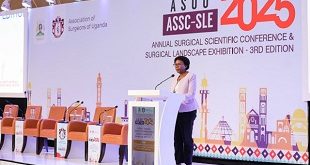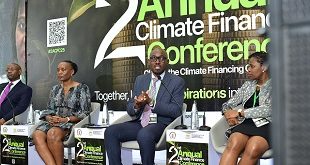
By Eriasa Mukiibi Sserunjogi
Is the low-key launch of the Uganda @ 50 celebrations a sign of disenchantment with independence?
Something seemed amiss at the launch of celebrations to mark Uganda’s 50-year independence anniversary. Whether it was due to lack of preparation or enthusiasm, the festivities at Serena Hotel on May 6 started off the uhuru season on an anti-climax.
But it is best to start with good news, which was a nod to the reality of Uganda’s history. The hotel lobby was graced with portraits of former presidents Edward Muteesa II, Milton Obote, Idi Amin, Yusuf Lule, Godfrey Binaisa, Paul Muwanga, Okello Lutwa; side-by-side with incumbent Yoweri Museveni who used to refer to some of them as “swine”.
One wall was decorated with beautiful batiks depicting ordinary life in Uganda, alongside Bendicto Kiwanuka, the first black chief justice, Princess Elizabeth Bagaya of Toro, as foreign minister in the 1970s and the national anthem’s composer, the late George Kakoma.
Kakooma would be proud that on October 9, the fiftieth Independence Day, all three stanzas of the anthem will be sung.
But why did half the seats in Victoria Hall remain empty? This is rare even on less auspicious occasions, especially when President Yoweri Museveni is chief guest.
Speaker of Parliament Rebecca Kadaga arrived about one-and-a-half hours late to join Vice President Edward Ssekandi and Chief Justice Benjamin Odoki. The prime minister, his deputies and most senior ministers were no show. Neither was Leader of Opposition Nandala Mafabi or any opposition MP, though that was less surprising.








Jaberi Bidandi Ssali and Abed Bwanika were the only opposition party leaders in attendance. Bwanika usually attends government functions, but Bidandi, like others of his generation including former Prime Minister Prof. Apolo Nsibambi and former Internal Affairs Minister Kirunda Kivejinja, probably did so out of nostalgia for the heady politics of the 1960s.
However, while this group were front-row witnesses to Independence, they were given no chance to share their testimony of those times. Instead the honour to wrap up Uganda’s post-independence history fell to Makerere University’s Prof. Augustus Nuwagaba – a famous academic, consultant, and graduate of the London School of Economics – but not widely thought of as a historian of distinction before then.
Nuwagaba noted that Museveni’s earlier regime had engineered “spectacular” economic growth, from 5.5% (1960-1968) to 9.4% (1990-1999) and 7.8% (2000-2009) making Uganda’s economy the third fastest growing in the world, only beaten by Turkey and China, though has been undermined by the current global recession to drop to 5%. The only blip is that the contribution and share in the national cake of the 76% majority of Ugandans locked in agriculture has been declining over the years.
Nuwagaba had two issues with the president, both related to the armed forces: While the Uganda People’s Defence Forces has managed to restore peace and discipline, Police abuse of citizens has reached a new level of notoriety.
“Give me the same powers over the civil service I have over UPDF and it will be disciplined within six months,” Museveni said, giving an example of how during the bush war, they executed two soldiers before a community of people among whom they had killed a person.
Museveni said it was difficult to discipline the public service due to “ideological confusion”. “Everyone is an authority on factories …bishops, traditional leaders, witch doctors …,” he said.
Without explaining his formula, Nuwagaba put First Lady Janet Museveni atop a list of women who have most influenced affairs in post- independence Uganda, for her efforts in fighting HIV/AIDS and mobilising the youth. Also on this list were athlete Dorcus Inzikuru, Nabagereka Sylvia Nagginda, Kadaga, activist Miria Matembe, investment advocate Maggie Kigozi, Uganda Revenue Authority head Allen Kagina, Brig. Proscovia Nalweyiso and Sara Ntiiro.
But Museveni disagreed with Nuwagaba on the Police, which he said is doing a good job even as opposition leaders misbehave. “Why should the public expect young police girls to behave when political leaders are misbehaving?” he asked.
Museveni drew laughter and applause when he said they had already reprimanded “the girl who pulled [FDC Women League Chairperson Turinawe] Ingrid’s dress”. “We want her to hold a person by the hand when arresting but not that part of the dress.”
Despite camera evidence that the opposition activist’s breast was handled by a man, the President stuck with the Police story that the arresting officer, who remains unnamed, was female.
Had Museveni arrived on time, perhaps his advice might have benefitted the policewomen on duty who, along with two men, dragged away a woman who had tried to enter the conference hall using an identity card so obviously false it had the picture of a white woman yet she was black. But the force’s customary force proved costly, leaving a glass window of the opulent venue smashed in the scuffle. So grisly was the sight that security operatives had to force this reporter to delete the picture he taken using his phone.
As organisers pleaded with guests to move from the back to fill empty front seats as the president was about to arrive, I thought it might have been smart to let in that woman – and others like her.
One-and-a-half hours late, Museveni launched the logo and website for Uganda’s 50th anniversary on the theme “A fifty year journey since independence from 1962 to 2012”. The logo is a “50” wrapped in the Uganda flag at the foot, a map of Uganda nested in the zero with a flying crested crane. “Beautiful,” I thought.
 The Independent Uganda: You get the Truth we Pay the Price
The Independent Uganda: You get the Truth we Pay the Price



